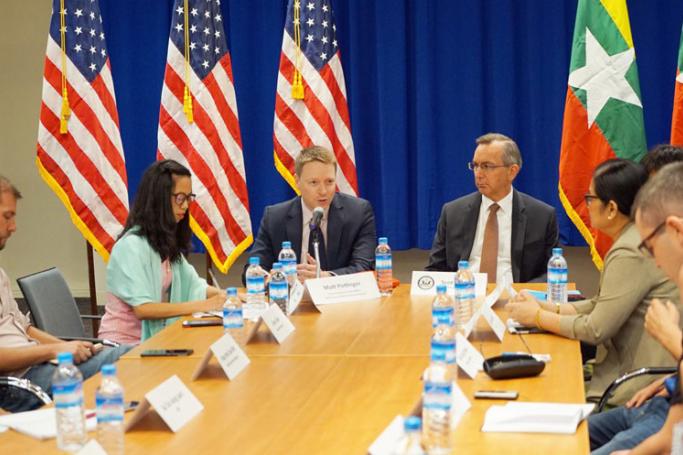A key adviser on Asian affairs to US President Donald Trump who recently made headlines for his existence being publicly denied, briefly appeared in Yangon on Thursday to speak with local media, having flown from Singapore the same morning after taking part in the US-North Korea summit on June 12.
Matthew Pottinger, the US National Security Council's senior director for Asian Affairs, expressed his hopes for bilateral relations between the United States and Myanmar and fielded questions on a range of topics at the American Center Yangon in Kamayut Township.
“For decades, US-Myanmar relations have been based on our support for freedoms and for democratic reform in this country,” Pottinger said. “I'm here because the United States cares about this country, President Trump cares about the country, and we care about our partnership.”
Pottinger highlighted ways that the US is working with farmers, banks, businesses and other institutions as part of approximately $120 million in aid to Myanmar for 2017.
The 45-year-old former Marine, journalist, hedge fund banker and now a top adviser on North Korea and China also addressed US concerns about intensifying conflicts in northern Myanmar, the production and flow of narcotics to neighbouring countries, and Myanmar's most talked about issue.
“The Rakhine crisis, in particular, has created an enormous humanitarian crisis that poses challenges for the entire neighbourhood, not just Myanmar,” Pottinger said. “It has also severely damaged Myanmar's image, harming Myanmar's ability to achieve your goals.”
Pottinger said that he would be discussing these and other issues in meetings with senior government officials the following day in Naypyidaw, where he is scheduled to meet with State Counsellor Aung San Suu Kyi and representatives from the Ministry of Defence.
When asked about Myanmar's relations with North Korea, Pottinger cited a letter that President Trump had written to the state counsellor “to in part thank her for the work that Myanmar has done to expel North Koreans who were helping fund the regime and its weapons programmes,” referencing US requests to Myanmar ahead of the summit that resulted in the forced closure of a North Korean-run restaurant in Yangon.
Pottinger also touched briefly on the Singapore summit, emphasising that all UN member states have a duty to uphold Security Council resolutions until a full dismantling of North Korea's nuclear programmes is achieved.
“If they don't wanna move quickly, then the pressure will remain, perhaps intensify,” Pottinger said.
Having reported on China over seven years for both Reuters and the Wall Street Journal, there has been a debate about how hawkish Pottinger is in his views on the rising power. When asked about China's influence in Myanmar, his comments were less than scathing.
“China is certainly capable of providing high-quality infrastructure projects and assistance, perhaps best exemplified through its Asia Infrastructure Investment Bank, which from what I've seen has maintained international standards,” Pottinger said. “At the same time, we've seen infrastructure projects funded by other organs of China that have fallen far short of those kinds of standards.”
For the final question of the afternoon concerning sanctions against Myanmar, Pottinger referenced targeted sanctions connected to the Rakhine crisis, but also said, “The Trump Administration is not considering broad economic sanctions against Myanmar.”
Following what is his first visit to the country, Pottinger is also scheduled to make stops in Thailand and Malaysia.
You are viewing the old site.
Please update your bookmark to https://eng.mizzima.com.
Mizzima Weekly Magazine Issue...
14 December 2023
Spring Revolution Daily News f...
13 December 2023
New UK Burma sanctions welcome...
13 December 2023
Spring Revolution Daily News f...
12 December 2023
Spring Revolution Daily News f...
11 December 2023
Spring Revolution Daily News f...
08 December 2023
Spring Revolution Daily News f...
07 December 2023
Diaspora journalists increasin...
07 December 2023
Eleven protestors charged for protesting over alleged election ‘cheating’












